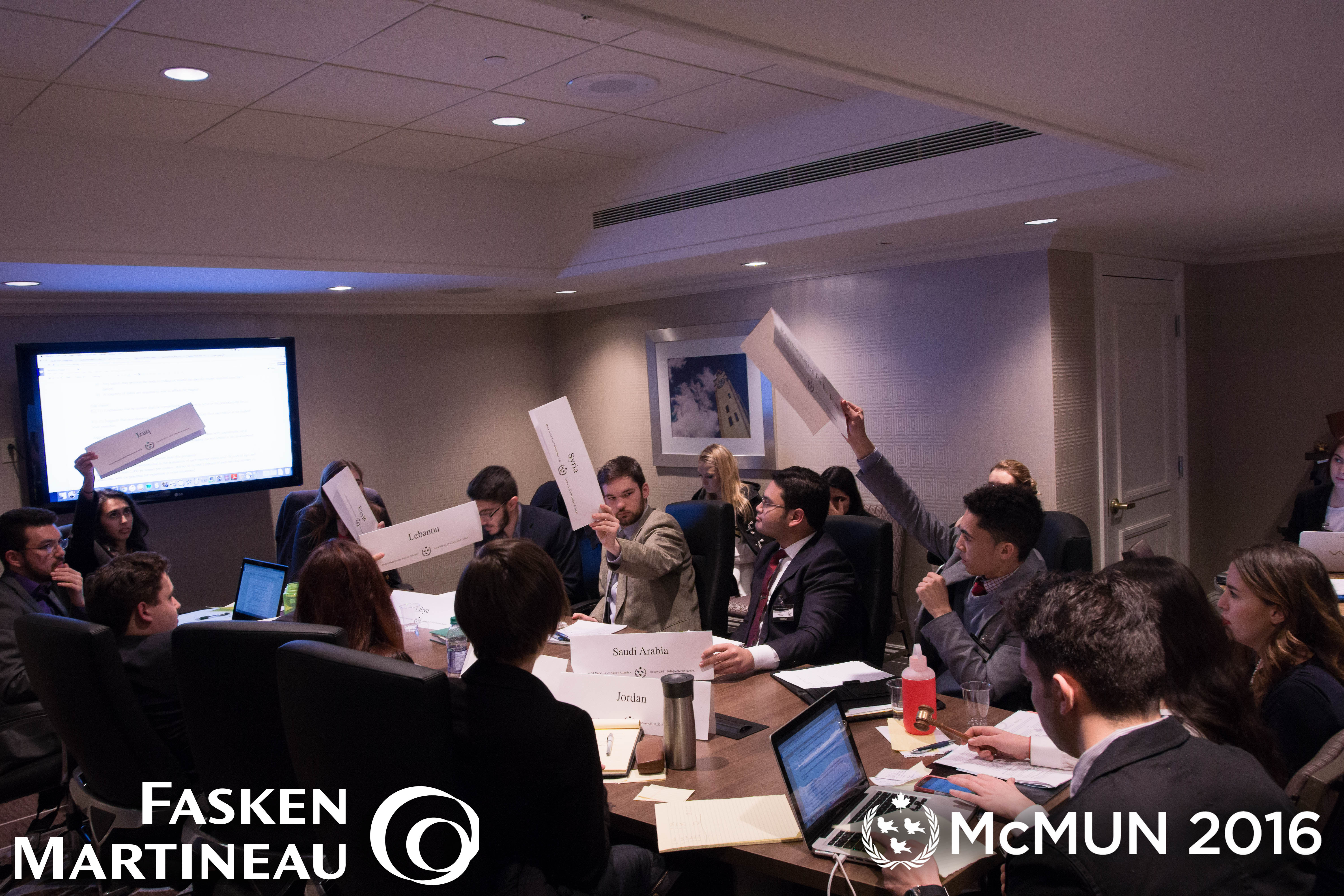Creative collaboration and innovative solutions: the Arab League’s response to the Algerian War

Saturday morning brought about the second day of discussions for the 1956 Arab League, and debates surrounding the Algerian War of Independence became the foundations for constructive deliberation and innovative resolutions. This organization representing independent Arab states demonstrated perseverance in assisting the National Liberation Front (FLN) in their struggle for independence, while still remaining cognizant of their respective national objectives and individual foreign relations. Nearly every state was enthusiastic in contributing materially in some form to the FLN, be it military or humanitarian aid, although the potential of severing ties with the West left several delegates wary about publicizing their involvement.
One particular matter that was heavily contested was the involvement of the USSR in any potential resolutions. It was apparent that all members of the League recognized the practicality of involving a superpower in the motion, yet an agreement on a specific nation became challenging to reach. Although delegates stressed that the USSR had the capacity and influence to aid in combating France, several states noted that involving the USSR, with its views contradicting the main values of Islam, would not reflect favorably upon the Arab League. Though several rational partnerships were proposed, it seemed that the United States presented the most logical partner on the world stage, pleasing delegates who were initially fearful of their national reputations being tarnished in the eyes of the West.
The delegate from Iraq then introduced a unique approach to foster transparency and garner international support by asking: “What can we do to show the world the extent of France’s abuse?” Her solution was to utilize major media outlets like the “Time” magazine to illustrate the injustices perpetrated by the French military. Yet in the midst of the FLN representative’s speech stressing the importance of adequate planning in this type of propaganda campaign, delegates were confronted with an intercepted French military transmission, containing the plans of an unforeseen attack on the town of Philippeville in a mere 24 hours. Members of the Arab League were reminded of the graveness of this impending attack, as an inadequate response would threaten the stability of the Algerian forces and enhance fears of French expansion. The dais called for the prompt formulation of a prudent strategy and made sure that delegates took the challenges of time-sensitivity and geographic distance into consideration. Fortunately, the Arab League successfully averted the crisis thanks to street barricades to slow down the French advance and implementing a defensive line of FLN forces along the coastline. Although this potential attack specifically targeted the FLN, several delegates noted that this felt like a direct attack upon the Arab League as a whole. This promptly generated solution demonstrated the unity and respect felt among members.
Philippeville in a mere 24 hours. Members of the Arab League were reminded of the graveness of this impending attack, as an inadequate response would threaten the stability of the Algerian forces and enhance fears of French expansion. The dais called for the prompt formulation of a prudent strategy and made sure that delegates took the challenges of time-sensitivity and geographic distance into consideration. Fortunately, the Arab League successfully averted the crisis thanks to street barricades to slow down the French advance and implementing a defensive line of FLN forces along the coastline. Although this potential attack specifically targeted the FLN, several delegates noted that this felt like a direct attack upon the Arab League as a whole. This promptly generated solution demonstrated the unity and respect felt among members.
Upon meeting for the final committee session of the day, it became apparent that the delegates were certainly progressing towards two cohesive working papers. However, as predicted, this journey was not without contention. Several amendments were introduced and heavily debated, yet delegates repeatedly acknowledged all additions and revisions considerably improved the overall quality and comprehensiveness of the final papers. With Working Paper 2.1 titled “Radical Approach to Humanitarian and Military Aid in Algeria” and Working Paper 2.2 outlining the establishment of a United Arab Peacekeeping Army (UAPA) both passing with a majority vote, the Arab League had evidently worked hard in preparing two comprehensive documents that all nations could stand behind.
“Imagine a game of telephone, but every time the message passes around the table it gets better”, the Syrian delegate noted in Saturday’s first session. This sentiment continuously echoed throughout the room during discussions, as delegates presented praiseworthy working papers filled with innovative solutions to the Algerian War. The commitment to allocate at least 1% of each interested state’s annual GDP to provide oil to the FLN and the urge for nations in the Arab League to incorporate education on colonialism into their schools were two among many creative solutions proposed by delegates. Although individual interests among nations were not unilateral, delegates shared the responsibility of the issue in an extremely equitable manner, and their cooperation and respect for each other during both sessions on Saturday was certainly worthy of praise.
Photo credits to McMUN/Philip Nguyen-Powanda
